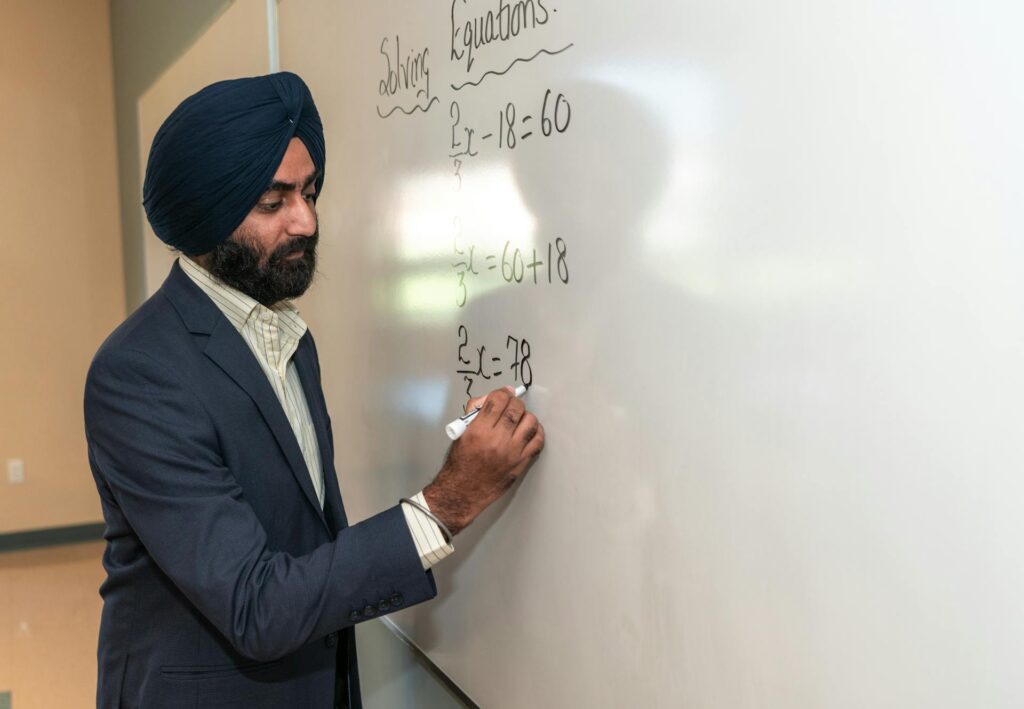GCSE Maths can be a daunting subject for students, often covering a broad range of topics from algebra to geometry, statistics, and trigonometry. No matter your level, having the right preparation strategies can make all the difference. At Oakwood Tutors, we specialise in helping students build confidence, master essential maths skills, and prepare effectively for exams.
This guide covers everything you need to know to set yourself up for GCSE Maths success, from study techniques to top resources that will reinforce learning and keep you on track.

Understand the Exam Structure and Syllabus
Before diving into revision, take the time to understand the GCSE Maths exam structure and syllabus. Knowing what to expect in the exam allows you to allocate your study time more efficiently. The GCSE Maths exam typically consists of three papers:
Paper 1: Non-calculator
Paper 2 and 3: Calculator
Each paper covers a mix of topics including algebra, geometry, probability, and more. Reviewing the syllabus for your exam board (such as AQA, Edexcel, or OCR) will help you see the specific topics covered and their weighting. This overview enables you to focus on high-priority areas while not overlooking any key topics.
Tip from our tutors: Print a checklist of topics from your syllabus and tick off each area as you review it. This visual progress tracker can be motivating and helps ensure no topic is missed.
Create a Realistic Study Plan
Once you know what’s on the exam, it’s time to create a structured revision plan. Everyone has a different learning style. But for every student, spreading out your study sessions over time is more effective than last-minute cramming, allowing you to retain information better and reducing stress.
Steps to Create Your Plan:
- Set Daily and Weekly Goals: Break down topics into manageable chunks and assign them to specific days. For example, one week could be focused on algebra and another on geometry.
- Balance Weak and Strong Areas: While it’s tempting to focus on topics you’re confident in, give extra attention to areas where you need improvement.
- Practice Regularly: Aim for a mix of reading, note-taking, and solving problems each session. Include past paper practice (more on this below) in your weekly schedule.
A good rule of thumb is to start revising 3–4 months before the exams and increase your study time (without overwhelming yourself) as the exam date approaches. A well-organised study plan reduces stress, keeps you accountable, and ensures consistent progress.
Use a Range of Study Resources
The right resources make all the difference in effective GCSE Maths preparation. Here are some that we highly recommend:
Textbooks and Revision Guides
- CGP GCSE Maths Revision Guides: CGP offers targeted revision guides that are easy to follow and packed with practice questions.
- Pearson Edexcel GCSE (9-1) Maths: These textbooks are specific to the Edexcel exam board, providing examples and exercises tailored to the syllabus.
Online Platforms and Apps
- BBC Bitesize: This free resource offers explanations, videos, and quizzes for each GCSE Maths topic, making it a great place to revise or reinforce what you’ve learned.
- Maths Genie: Offers past papers, topic-by-topic resources, and video explanations, perfect for those who want extra practice.
- DrFrostMaths: A popular online platform with interactive resources, past paper questions, and comprehensive revision materials.
YouTube Channels
- HegartyMaths: This YouTube channel provides step-by-step explanations for almost every GCSE Maths topic, making complex concepts easier to understand.
- Primrose Kitten: Offers focused revision videos and exam walk-throughs, helpful for students who need visual aids and additional explanations.
Using a mix of resources keeps study sessions engaging and offers multiple ways to understand and practise each topic.
Practice with Past Papers
One of the best ways to prepare for any exam is to practise with past papers. Working through these papers gives you a feel for the types of questions you’ll face, the exam format, and time management skills. Past papers also help you identify any recurring themes or question types, allowing you to focus on patterns that may appear in your exam.
How to Use Past Papers Effectively:
- Simulate Exam Conditions: Time yourself and complete each paper without distractions. This helps build stamina and improves time management.
- Review Mistakes: After finishing a paper, go through your mistakes carefully. This is where the real learning happens. Try to understand why you made each mistake and revisit the topic if necessary.
- Track Your Progress: Keep a record of your past paper scores to monitor your improvement over time. Seeing your progress will boost confidence and help you stay motivated.
Master Time Management Skills
GCSE Maths exams require you to manage your time wisely. Many students find themselves running out of time, often leaving questions unanswered. To avoid this, practise the following time management strategies:
- Prioritise Questions: Answer the questions you’re most confident in first, then go back to tackle more challenging problems. This way, you secure as many marks as possible before dealing with difficult questions.
- Allocate Time Per Question: Divide the total exam time by the number of marks to estimate how much time to spend on each question. Keep a close eye on the clock and move on if you’re spending too long on a single question.
- Leave Time for Review: Aim to finish with 10–15 minutes to spare so you can double-check your answers and correct any careless mistakes.
Practising these time management techniques will allow you to approach the exam with a clear plan, improving both your accuracy and confidence.
Stay Positive and Manage Stress
It’s normal to feel anxious before a big exam, but managing stress is key to performing well. A positive mindset helps you approach revision and the exam itself with more focus and resilience. Here are some ways to stay calm and maintain motivation:
- Take Regular Breaks: The brain can only focus for so long, so take a break every 45–60 minutes. Short breaks keep your mind fresh and prevent burnout.
- Stay Active: Physical activity is a great way to reduce stress. Going for a walk or doing some exercise you enjoy can help clear your mind and boost concentration.
- Practice Relaxation Techniques: Deep breathing, meditation, or visualisation exercises can all help lower anxiety. Consider incorporating a few minutes of these techniques into your daily routine.
- Celebrate Progress: Set mini-goals and reward yourself for meeting them. Celebrating small wins keeps you motivated and helps build momentum.
By taking care of your mental well-being, you’re setting yourself up for a successful and positive exam experience.
Final Thoughts
Preparing for GCSE Maths can feel challenging, but with the right strategies and resources, you can approach the exam with confidence and clarity. Remember, consistent practice, smart time management, and a positive mindset are your best tools for success. If you need additional support, Oakwood Tutors offers tailored GCSE maths tutoring that aligns with your school’s syllabus and focuses on your unique strengths and weaknesses.
Contact us today to learn more about how our GCSE Maths tutors can help you achieve your goals and make your revision journey easier and more effective. With dedication, the right resources, and a supportive environment, you’ll be well-prepared to excel in your GCSE Maths exam.

